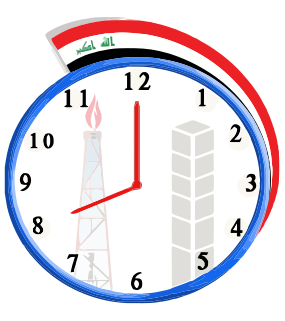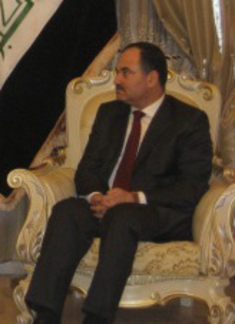The politics of Iraq take place in a framework of a federal parliamentary representative democratic republic. It is a multi-party system whereby the executive power is exercised by the Prime Minister of the Council of Ministers as the head of government, as well as the President of Iraq, and legislative power is vested in the Council of Representatives and the Federation Council.

Ayad Allawi is an Iraqi politician. He served as Vice President of Iraq from 2014 to 2015, interim Prime Minister of Iraq from 2004 to 2005 and was the President of the Governing Council of Iraq in 2003. He became Vice President again, in October 2016.

The Iraqi Islamic Party is the largest Sunni Islamist political party in Iraq as well as the most prominent member of the Iraqi Accord Front political coalition. It was part of the government of Prime Minister Nouri al-Maliki and is part of the current government of Haider al-Abadi since 2014. Osama Tawfiq al-Tikriti succeeded Vice-President Tariq al-Hashimi as the party's secretary-general on 24 May 2009, who was succeeded in July 2011 by Ayad al-Samarrai.

The National Iraqi Alliance, also known as the Watani List, is an Iraqi electoral coalition that contested the Iraqi legislative election, 2010. The Alliance is mainly composed of Shi'a Islamist parties. The alliance was created by the Supreme Council for Islamic Revolution in Iraq to contest in the January 2005 and December 2005 under the name United Iraqi Alliance, when it included all Iraq's major Shi'a parties. The United Iraqi Alliance won both those of elections however later fell apart after several major parties left the alliance due to disputes with Prime Minister Nouri al-Maliki and the Supreme Council.

Parliamentary elections were held in Iraq on 30 January 2005 to elect the new National Assembly, alongside governorate elections and a parliamentary election in Iraqi Kurdistan. The 275-member legislature had been created under the Transitional Law during the international occupation. The newly elected body was given a mandate to write a new constitution and exercise legislative functions until the new constitution came into effect. The elections also led to the formation of the Iraqi Transitional Government.

The Council of Representatives is the unicameral legislature of the Republic of Iraq. It is currently composed of 329 seats and meets in Baghdad inside the Green Zone.

The Iraqi Accord Front or Iraqi Accordance Front also known as Tawafuq is an Iraqi Sunni political coalition created on October 26, 2005 by the Iraqi Islamic Party to contest the December 2005 general election. As a large section of Iraq's Sunnis are composed by the populous Kurds, situated in northern Iraq and locally autonomous, the party's members are mostly Arab, and as such, its political efforts have largely been focused on protecting this community's interests as opposed to Iraq's non-Sunni population. In the 2005 election, its platform called for ending the US occupation of Iraq, revision of the new Iraqi constitution, repeal of the de-Ba'athification laws that had cost many Sunnis their government jobs and the restoration of the Iraqi Army, which was dissolved after the US overthrow of Saddam Hussein and which had a Sunni dominated officer corps. Despite this, the party has maintained that it is non-secular, even though the Ba'ath Party contained many prominent Sunnis.

Following the ratification of the Constitution of Iraq on 15 October 2005, a general election was held on 15 December to elect a permanent 275-member Iraqi Council of Representatives.
The Iraqi Front for National Dialogue also known as Hiwar is a Sunni Arab-led Iraqi political party.
The Sons of Iraq were coalitions between tribal Sheikhs in the Al Anbar province in Iraq as well as former Saddam Hussein's Iraqi military officers that united to maintain stability in their communities. They were initially sponsored by the US military.

Sheik Ahmed Bezaa Abu Risha is a Sunni leader in the Al-Anbar province, and led the movement of Sunni tribesmen known as the Anbar Salvation Council.

A parliamentary election was held in Iraq on 7 March 2010. The election decided the 325 members of the Council of Representatives of Iraq who would elect the Iraqi prime minister and president. The election resulted in a partial victory for the Iraqi National Movement, led by former Interim Prime Minister Ayad Allawi, which won a total of 91 seats, making it the largest alliance in the Council. The State of Law Coalition, led by incumbent Prime Minister Nouri Al-Maliki, was the second largest grouping with 89 seats.

Rafi Hiyad al-Issawi is an Iraqi politician who is a former finance minister and deputy prime minister. A doctor by profession, he is the fourth most senior politician from the Sunni Arab minority after former Vice President Tariq al-Hashemi, Deputy Prime Minister Saleh al-Mutlak and Speaker of the Iraqi Parliament, Usama al-Nujayfi.
The Baghdad governorate election of 2009 was held on 31 January 2009 alongside elections for all other governorates outside Iraqi Kurdistan and Kirkuk.

The Nineveh Governorate election of 2009 was held on 31 January 2009 alongside elections for all other governorates outside Iraqi Kurdistan and Kirkuk.
The Iraq Awakening and Independents National Alliance is an Iraqi political coalition formed to contest the Al Anbar governorate election, 2009. It obtained 8 out of 29 seats - the highest of any party list.
The Tribes of Iraq Coalition also known as the Anbar Salvation Council is an Iraqi political coalition formed to contest the Al Anbar governorate election, 2009 which won 2 out of 29 seats. The party was one of several formed out of the Awakening movements - Sunni tribal militias armed and financed by the United States Army to fight al-Qaeda in Iraq. The coalition was led by Sheikh Hamid al-Hais. In an interview with the Washington Post prior to the election, Hais said he would kill all the Iraqi Islamic Party's candidates if anything happened to any of his candidates.
Harith Mohey Al Deen Abd al-Obeidi was an Iraqi politician and cleric and member of Parliament for the Iraqi Accord Front. He was assassinated on 12 June 2009.

Parliamentary elections were held in Iraq on 30 April 2014. The elections decided the 328 members of the Council of Representatives who will in turn elect the Iraqi President and Prime Minister.












